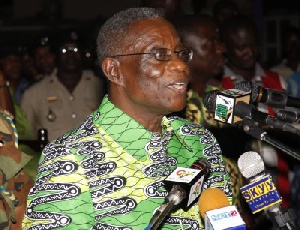The Public Relation (PR) of the Mills Administration is weak. This places the government in grave danger of losing public fervor. Wonderful things have happened in Ghana since January 7, 2009 but have not been communicated to the masses of the people well enough. As a result, the opposition New Patriotic Party (NPP) is having a field day throwing dust into the eyes of the public.
This reporter does not believe the clear weakness in the government PR could make the government so much unpopular as to costing it the 2012 general elections. But the fact is that it kills public enthusiasm and goodwill towards the government. Consequently, unnecessary public pressure is being brought to on the President. And that is not good enough.
There have been complaints from the public about lack of effective and efficient communication of government actions, policy decisions and implementation to the barest understanding of the masses of the people. Even if that did happen, in some cases, the information was either too scanty and short-lived or distorted.
There have been media reports that the foot soldiers of the NDC are demanding that the President speaks to them. The situation would have been different if government information communications have been apt.
The Mills-led NDC government has a comprehensive setup of communications unit. At the Presidency, there is the Communications Directorate headed by Mr Koku Anyidoho. Then there is the Presidential spokesperson who is Hon Mahama Ayariga. Apparently, there is a group which handles information and communications at the Office of the Vice President.
In charge of disseminating government information from the Ministry of Information are the Minister, Mrs Zita Okaikwei and her two Deputies, Mr James Agyenim Boateng and Mr Samuel Okudzeto Ablakwa.
Added to that is the outfit called Strategic Communications of Government responsible for coordinating information within the Presidency and the Ministry of Information.
The contradictions and inconsistencies in government information dissemination have also not helped. Mr Koku Anyidoho and Mrs Zita Okaikwei contradicted each other on air over government position regarding its dealings with the media and that was not good enough. When President Atta Mills was about to embark on his last trip to the United Kingdom, there was inconsistency in the total number of his entourage as made known to the public by the Ministry of information and the Presidency.
The big question then is, why the glaring lax in the effective dissemination of government information to the people of Ghana despite all the positive developments under the Mills administration, thereby exerting undue pressure on the President?
It is also quiet obvious that the NDC government still does not have full control of the structures on the ground for effective communication of government information to the people. Fact is, the New Patriotic Party (NPP), which has over the years groomed a powerful media propaganda machine on the ground still has firm grips.
Most of the Public Relations Officers (PRO) in the Ministries, Departments and Agencies (MDAs) who are supposed to be civil servants, have strictly maintained the status quo by discriminating against the pro-government media to the advantage of the opposition NPP.
That not withstanding, the NDC government has not shown any commitment of making sure the discriminations against the pro-government press that helped it to come to power ceases. The anti-government press is still giving an edge and the pro-government press referred to as the “other press” by some information handlers at the Castle, for example.
Dear reader, that is why you still see the tons of advertisements from the MDAs and other government sources in the anti-government press on a daily basis at the expense of the pro-government press, which has demonstrated tenacity in the wake of collapse by some anti-government press.
At a press briefing at the launch of the NDC’s 2008 Campaign Manifesto at the Trade Fair Centre in Accra, the then Running Mate to then Candidate Atta Mills, John Dramani Mahama made a solemn pledge to the private media. According to him, his government would see to equitable distribution of advertisements to the press as a way of empowering them financially.
Eight months into his vice presidency, the same old order of preference for the NPP media still firmly holds, and the pro-government press is asking why.
Most of the newspaper review programmes on the electronic media which set the tone for media discussions on each day and other such programmes, whether openly or subtly, are still heavily tilted to place the Mills government at a disadvantage in the public eye. This reporter can also not gloss over some very disturbing happening within the presidency that is contributing to the communications problems. This has to do with little squabbles over turf between the Communications Director at the Presidency and the Presidential Spokesperson as to who really calls the shots.
The NPP did many things the wrong way whilst in government which information if managed well could place the NDC government way above the top. Government PR must learn to put the opposition NPP on the defensive at all times rather than being the one defending almost all the time.
The government’s communications strategists and handlers must wake up to the realization that it has a huge task to perform in shaping the minds of members of the public in line with the realities of the Mills administration and this requires innovation and tact. That way, President Mills will have his peace of mind to lead
General News of Wednesday, 9 September 2009
Source: The Catalyst













